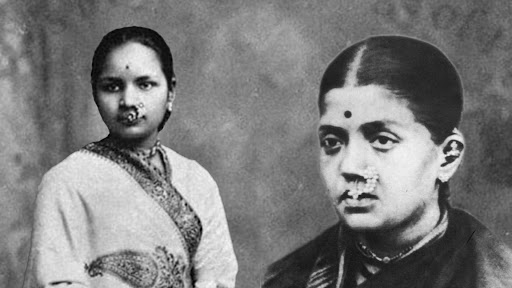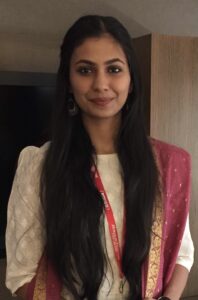Dr. Anandibai Joshi and Lakshmibai Tilak embarked on two separate paths for education and yet their paths coalesce into a strong liberal expression for emancipation of the individual.
As liberal feminist ideas became more articulate and the suffrage movement became stronger in America, an intellectual churning shaped the Indian psyche in the latter half of the 19th century. At the center of this churning lay the issue of women’s education. Pandita Ramabai, Savitribai Phule, Ramabai Ranade, Dr. Anandibai Joshi, Lakshmibai Tilak among others, worked towards emancipation of women through education. This article looks at Dr. Anandibai Joshi and Lakshmibai Tilak and their fight for education. Dr. Anandibai Joshi and Lakshmibai Tilak embarked on two separate paths for education and yet their paths coalesce into a strong liberal expression for emancipation of the individual.
At the mere age of 17, Anandibai Joshi sailed alone to America with the dream of becoming a doctor. Her journey up till this point is infused with grief, loss, and a constant battle against orthodoxy. Ever since their marriage when Anandibai was 9 years old, her husband, Gopalrao Joshi was keen on educating her. Against the wishes of Anandibai and her family, Gopalrao began educating her. His methods of teaching were often exacting and naturally Anandibai showed no keen inclination towards learning. When she was 14, she lost her infant; Anandibai came to believe that her infant could have been saved had there been a native, Hindu, female doctor that she could seek help from. This loss awakened the desire for education in her and she sought to get medical education. Gopalrao supported her decision and the couple decided to look for medical colleges abroad. In a speech at Serampore, Anandibai explained that most Indian medical colleges trained women for midwifery; the only college in Madras presidency which trained women to become doctors, treated female students with disdain.
Gopalrao began correspondences with several philanthropic organizations but received no response. He also appealed to Rev. Wilder of Princeton for helping him and his wife travel to America in September 1878. Rev. Wilder advised the couple to stay in India and to “confess to Christ immediately.” (Kosambi, 1996, p. 3190) While Gopalrao gave the suggestion a serious thought, Anandibai firmly rejected it. Anandibai was a staunch Hindu and refused an education that would strip her of her faith. Anandibai then applied to Women’s Medical College of Pennsylvania where she could study while practicing her faith. Before leaving for America, Anandibai took a public vow at a gathering in Serampore, “I will go to America as a Hindu and return as a Hindu.” (Kosambi, 1996, p. 3195) Contrary to Gopalrao’s ambiguous position on colonialism and Hinduism, Anandibai was a nationalist and sought to retrieve ancient Hindu knowledge. Anandibai wrote to Mrs. Carpenter on 15 November 1880, “The Europeans are under the impression that there is nothing worth knowing in Hindu scriptures and I have therefore taken up Sanscrit to show them how sublime, useful, and instructive are the precepts in Hindu Shastras.” (Kosambi, 1996, p. 3194) Her steadfast belief in her faith is seen in her medical dissertation for MD, which was titled, ‘Obstetrics among the Aryan Hindoos’.
When Dr. Anandibai Joshi and Gopalrao returned to India in 1886, the Mahratta newspaper congratulated Dr. Anandibai and praised her for abiding by her public vow. “We bid a hearty welcome to Gopalrao Joshi and his wife, now Dr. Anandibai Joshi who returned to India by the last Mail Steamer… the difficulties of Mrs. Anandibai were such as no man or woman of ordinary moral and physical strength could have overcome. Happy it is that the worthy husband and wife have conquered all these difficulties and come back to India with Western culture but without a taint of Western vice. Mrs. Joshi has preserved her Hindu habits and customs and that too at no small personal inconvenience.” (Mahratta, 21 November 1886)
While Dr. Anandibai stood by her public vow and her faith, she spoke openly about the restrictions imposed on Hindu women. In her speech at Serampore, she also highlighted the difficulties faced by Hindu women while seeking education. Dr. Anandibai said, “I am neither a Christian nor a Brahmo. To continue to live as a Hindu and go to school in any part of India is very difficult. A convert who wears an English dress is not stared at. Native christian ladies are free from the opposition of public scandal which Hindu ladies like myself have to meet within and without the zenana.” (Kosambi, 1996, p. 3194)
Like Dr. Anandibai, another tale of perseverance, was taking shape in the form of Lakshmibai Tilak. Manakarna Gokhale was married off to Narayan Waman Tilak (henceforth Rev. Tilak) at the age of 11 and assumed the name Lakshmibai Tilak. Lakshmibai’s childhood was scarred by her father’s extreme conformity with orthodoxy and she was made to remain illiterate. After her marriage, she kept tackling orthodoxy as her father-in-law, Wamanrao Tilak ran the house on dictatorial terms. Wamanrao’s wife was literate and composed poems; concealing his contempt behind the facade of orthodoxy, Wamanrao burnt all of his wife’s poems. He also burnt a book on morality that was gifted to his wife by missionary women.
Against the severe contempt for women’s education, Rev. Tilak began educating his wife, Lakshmibai Tilak. His methods of teaching, much like those of Gopalrao, were taxing and Lakshmibai found no joy in learning. “Tilak wanted his wife to become something, someone renowned – a writer, a poet, or an orator. And he always took efforts in that direction” [1](Tilak, 2012, p. 251)[2]. But Tilak’s insistence on perfection and the larger societal restrictions became obstacles for Lakshmibai.
Rev. Tilak often left his wife alone as he went on spiritual quests and traveled in search of answers. At one point, he even declared renunciation of the world. Rev. Tilak’s erratic behavior was attributed to Lakshmibai, and her presence was often treated as a bad omen at her marital home. When Rev. Tilak converted to Christianity, he was excommunicated from his community. Lakshmibai, though continued to be a Hindu, suffered mistreatment at the hands of her own community. Lakshmibai and her toddler Dattu moved villages and lived isolated lives. During this period of isolation, Lakshmibai started reading books, working hard to master the difficult जोडाक्षर (alphabet with a vowel and two or more consonants). It brought about a transformation within her as writes in her autobiography, “the chains of casteism that had gripped my mind broke down. I shed my casteist beliefs. Henceforth, every living being is equal in my eyes.”[3] (Tilak, 2012, p. 231-2) In order to seek an education free of caste biases and of boundaries of ‘pure’ and ‘impure’, Lakshmibai converted to christianity. Lakshmibai refused to receive her baptism from the English missionaries or from upper caste christians and instead she received it from Rev. Vaniramji Bapuji Ohol. Staying true to her transformation, Lakshmibai adopted three beggar kids – Houshi, Daya and Bhiku.
Lakshmibai had also started addressing religious congregations in Ahmednagar. She refused to read out the speeches that Rev. Tilak wrote for her. “I will not read out [what you have written down]. I will speak what comes to my mind.”[4] (Tilak, 2012, p. 252) Around the same time, Lakshmibai decided to take up medical education from Dr. Julia Bisel, Dr. Bills and Dr. Harding. Lakshmibai had earlier studied Indian medicine and she complemented it with her American medical training. She also worked at the Plague camp as a nurse, providing medical aid to the patients. Lakshmibai had broken free of the orthodoxy that had kept women illiterate; this liberation set her mind free and she started composing poetry. Rev. Tilak had undertaken the task of writing ‘Khristayan’, an epic detailing the life of Christ; he passed away after writing 10 chapters. Lakshmibai completed the epic by adding 64 chapters to the poem. Subsequently, Lakshmibai also wrote her autobiography serialized in the weekly magazine Sanjeevani. Knowingly or unknowingly, Lakshmibai had truly transformed into a ‘a writer, a poet and also an orator’.
Lakshmibai Tilak and Dr. Anandibai Joshi fought for emancipation and education. Both sought to free themselves from the orthodoxy that had caged and scarred women. Building on the primary education imparted by their respective husbands, both Lakshmibai and Dr. Anandibai carved out their own path and embodied agency. Dr. Anandibai and Lakshmibai, through their separate paths for empowerment, reiterated and affirmed liberal ideas in the intellectual churning of the 19th century.
References
Kosambi, M. (1996). Anandibai Joshee : Retrieving a Fragmented Feminist Image. Economic and Political Weekly, 31(49), 3189–3197. http://www.jstor.org/stable/4404856
Tilak, L. (2010). Smritichitre (4th ed.) [Print]. Samanvay Prakashan.
Endnotes
[1] All translations are by the author of this piece.
[2] टिळकांना फार हौस की आपल्या बायकोने कोणी तरी मोठ्ठे व्हावे. लेखिका, कवयित्री, वक्ती तिने बनावे. व ह्या दिशेने ते नेहमी प्रयत्न करीत.
[3] माझ्या मनाला जखडून टाकणाऱ्या जातीभेदाच्या साखळ्या खळाखळ तुटून पडल्या. बस. माझा जातीभेद गेला. यापुढे मला सर्व सारखे आहेत.
[4] मी पाठ करून बोलणार नाही. मला माझ्या मनाला वाटेल तसे बोलेन.


